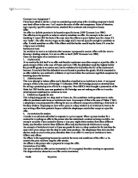The Legal Principle of Frustration has been limited by the Courts. Explain why and how this has been done
Mark Lam JianHao
Saturday, 12 March 2011
The Legal Principle of Frustration has been limited by the Courts. Explain why and how this has been done.
Frustration is an event that occurs beyond the control of any parties in a contract that prevents either of the parties from performing their part in fulfilling the contract. However, this is a recent development as common law states that a party was bound to perform their obligations under contract regardless of intervening events and would override any circumstances as in the case of Paradine v Jane in 1647 where Jane had to pay rent even after being forced off the land due to an invasion. The doctrine was developed as a response for a party to discharge the contract due to unforeseeable situations that interrupt the contract. The result is that both parties would be relieved of the burden of performing and the liability for not performing. There are three main types of frustrating events; the first Impossibility is where the event makes performance impossible. This may happen due to the destruction of the subject matter or if it is otherwise unavailable as in Taylor v Caldwell in 1863. But it must been held or intended by both sides to be the subject matter. The second Illegality is where the performance of the contract becomes illegal to do due to either the outbreak of war or the change of a law. An example would be Avery v Bowden in 1855 when a war broke out and Russia became the enemy, trading with them would be illegal. The third type is that of Commercial Sterility, where the commercial purpose has failed as in Kell v Henry in 1903 where a party hired a room to view the coronation procession of King Edward but he took sick and it was cancelled, it was held that the contract was frustrated as the purpose was to view the coronation not to just rent the room. However, all commercial purpose must be destroyed and if any remain, the contract is under obligations to continue.








